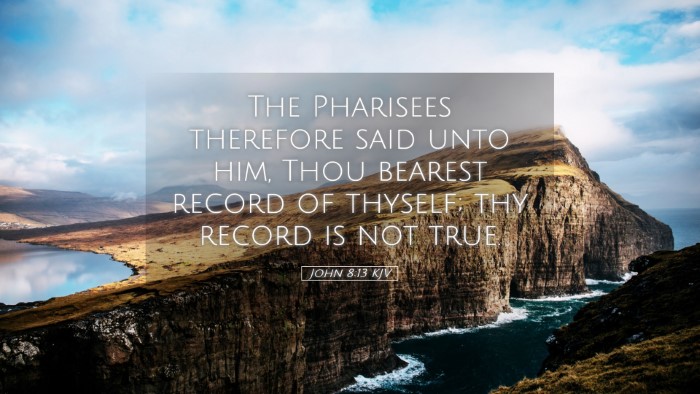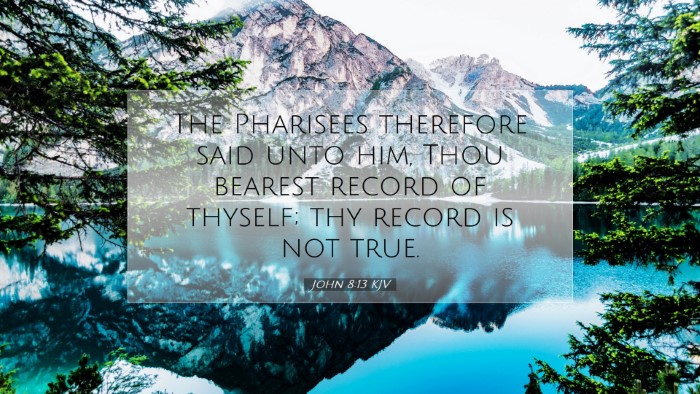Commentary on John 8:13
Verse: "The Pharisees therefore said unto him, Thou bearest record of thyself; thy record is not true."
Introduction
In this verse of John 8:13, we witness a pivotal moment in Jesus’ discourse with the Pharisees, which reveals both the tension between Jesus and the religious leaders of His time as well as His assertion of truth in His divine identity. This verse serves as a fulcrum for understanding the broader themes of light, truth, and authority present throughout the Gospel of John.
Contextual Analysis
The conflict between Jesus and the Pharisees is neither casual nor benign; it is steeped in theological implications. The Pharisees, as representatives of the Jewish religious establishment, challenge Jesus’ claims and authority repeatedly. This specific verse is an interaction reflecting their skepticism and highlights the challenges faced by Jesus in affirming His identity as the Messiah.
Matthew Henry's Insights
-
The Nature of Accusation:
Matthew Henry emphasizes that the Pharisees’ accusation—that Jesus’ testimony is not true—stems from their total misunderstanding of His divine authority. They fail to recognize His unique relationship with the Father, which disqualifies Him from the requirement of human witnesses.
-
The Importance of Witness:
Henry also elaborates on the significance of divine testimony contrasting human testimony, asserting that mere human judgment is insufficient to validate God’s truth. This misunderstanding exemplifies the spiritual blindness that afflicts the religious leaders.
Albert Barnes' Commentary
-
Critique of Self-Witness:
Barnes points out that Pharisees adhered to the Mosaic Law, which required two witnesses for testimony to be considered valid (Deuteronomy 19:15). They use this criterion to dismiss Jesus’ claims, reflecting their legalistic mindset. Barnes argues that while their point holds, they fail to realize that Jesus operates under divine authority, surpassing the necessity of human witnesses.
-
Authority of Christ’s Testimony:
Barnes further asserts that the testimony of Jesus stands unique because it is not merely self-referential but grounded in His divine nature. He proves to be the ultimate and truthful witness because His identity and mission are intrinsically linked to the revelation of God.
Adam Clarke's Reflections
-
The Historical Context:
Clarke provides a historical perspective, highlighting the animosity between Jesus and the Pharisees, illustrating how this conflict is reflective of larger socio-political tensions of the time. He underscores that this interaction underscores the persistent resistance to accepting divine truth when it challenges established religious norms.
-
Spiritual Implications:
Moreover, Clarke emphasizes the spiritual implications of the Pharisees’ rejection. The theme of bearing witness to one’s identity runs throughout Scripture, and the insistence on Jesus’ failure to meet their criteria showcases the failure of human wisdom to grasp divine realities.
Thematic Elements
-
Light vs. Darkness:
This passage occurs within the broader theme of light and darkness present in the Gospel of John. The refusal of the Pharisees to see the truth of Christ’s testimony reflects a moral and spiritual darkness, a rejection of the light that Jesus embodies.
-
Authority and Testimony:
Jesus’ authority is a recurring theme in the Johannine literature, and here He starkly contrasts human authority with divine authority. His witness is rooted in His identity as the Son of God, and hence it stands true, regardless of human validation.
Conclusion
The statement in John 8:13 encapsulates the deep-seated opposition Jesus faced from religious leaders who are entrenched in their understanding of the Law. Through the insights of Henry, Barnes, and Clarke, we can appreciate the multifaceted layers of theological, historical, and spiritual implications contained within this verse. For pastors, students, and scholars, John 8:13 invites a reflection on the nature of truth and authority in the Christian faith, urging believers to seek a deeper understanding of Christ’s identity as not only a challenging prophet but as the very embodiment of divine truth.


